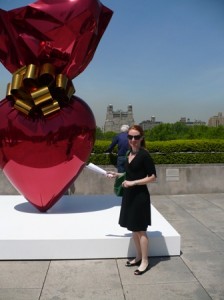Now on view thru September 7, 2008 at the National Academy Museum is the 183rd Annual Invitational Exhibition of Contemporary American Art which includes works of art from 125 different artists chosen by a curatorial committee. Though not an avant-garde selection as you might find in a contemporary art fair, for example, there are some interesting pieces ranging from paintings to installation pieces to sculptures. The installation works were unusual for the National Academy, and I really enjoyed them: Lisha Bai’s trippy black and white linoleum floor laid down in a vestibule which seemed fantastic in a classic Beaux-Arts townhouse where one might expect to see a black and white marble floor; and Soo Sunny Park’s “Fractal Immersion” where the viewer looks through an opening in the wall, through a mesh-like surface, into an uncertain depth of reflections and openings. The paintings are usually the strongest suit at the National Academy and there were some excellent examples once again, this time from painters David Collins, Bill Scott, Lee Marshall, Jeanette Fintz, Julie Heffernan, Barbara Takenaga, Sean Skully and Anthony Thompson to name a few.
1083 Fifth Avenue between East 89th and 90th Streets.

